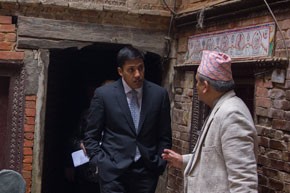
For Immediate Release
Today, USAID Administrator Dr. Rajiv Shah completed a two-day visit to Kathmandu, during which he announced approximately $100 million in support of the people of Nepal subject to the availability of funding. Dr. Shah met with Prime Minister Sushil Koirala and other key political leaders and spoke at the closing session of the Nepal Economic Summit, where he stressed the private sector’s role in accelerating Nepal’s economic growth. Dr. Shah also visited sites that highlight USAID’s commitment to using innovation, science, technology, and partnerships—with the Nepali government, civil society, and the private sector—to deepen development impact.
At a press roundtable today, Dr. Shah announced the following activities to be implemented over the next five years:
- Up to $70 million Community Resilience Program integrating disaster risk reduction and climate change adaptation into an expansion and deepening of USAID’s food and nutrition security efforts in Nepal. A quarter of Nepal’s population lives below the international poverty line of $1.25 per day, and this program will benefit an estimated 5 million of the most vulnerable in Nepal’s hill regions. It will also support the Government of Nepal’s efforts to strengthen community resilience and stimulate inclusive growth.
- Five-year, $20 million support to the National Early Grade Reading Program. Under Ministry of Education leadership, USAID aims to improve the reading skills of more than one million children in grades 1 to 3 in twenty districts in the Mid- and Far-Western regions. USAID is now conducting the first-ever nationwide Early Grade Reading Assessment, creating a baseline against which to measure improved reading skills.
- Three-year, $4.1 million Business Literacy Project will operate in twenty Terai and lower hill districts in the Far-Western, Mid-Western, and Western Regions, complementing ongoing Feed the Future agriculture and nutrition activities. The project will build the literacy, numeracy, life and business skills of an estimated 48,000 women, youth, disadvantaged groups, and ethnic minorities so that they can run small-scale enterprises, access public services, and participate in the economy.
- $10 million partnership between USAID, DFID and the Government of Nepal will help increase access to family planning services for some of Nepal’s most excluded households. This program is expected to become a model for expanding health care to hard-to-reach groups.
- $500,000 Innovative Early Warning Flooding System USAID’s Office of Foreign Disaster Assistance will fund an early warning system to help protect communities in the Mid- and Far West regions from flooding. The project will install gauges along flood- prone rivers and share data in real time with district authorities using SMS and email. This will help save lives and livelihoods in the event of a pending event.
For more information, visit www.usaid.gov







Comment
Make a general inquiry or suggest an improvement.